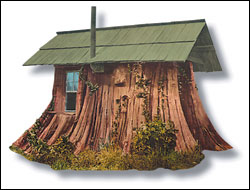IN THE SUMMER of 1972, while George W. Bush was skipping his military physical, I was getting mine. I went through pre- induction testing at the Selective Service center at Interbay, where doctors checked out the latest sorry gaggle of potential draftees. Stripped to our skivvies, hundreds of young men of all shapes, sizes, races, and backgrounds were herded through a series of tests (“Turn your head and cough!”). We were poked, prodded, and questioned as examiners gathered data on everything from our eyesight to IQs.
We were all 18-year-old lottery losers. Lady luck had given us some of the very few low draft lottery numbers, which made it a virtual certainty that we’d be called up. My number was 31 out of 365, almost guaranteed cannon fodder. In retrospect, our group had one distinction: Those of us born in 1953 were the last class of draftees to be sent to Vietnam.
THE QUESTION of Vietnam service still haunts presidential politics, from Bill Clinton’s draft evasions to Bush’s spotty service in the Texas Air National Guard; from John Kerry’s heroism for and against the war to Bob Kerrey’s war crimes; from John McCain’s POW scars to Howard Dean’s ski-bumming with a “bad back.” There is talk of war, honor, desertion, duty, draft dodging, and cowardice. Where were you in 1972? Were you a hero or a hippie? Or did you blow off the boomer’s Big War? Were you dove, hawk, or chicken hawk?
I was a dove. I attended my first antiwar rally in 1968 and protest marched into the ’70s. I also opposed—and still do—any sort of draft or compulsory service. When I turned 18, I registered to vote—the voting age had just been lowered—and attended my Democratic caucus. I was a George McGovern delegate to the King County Democratic convention and canvassed blue-collar suburban Portland looking for McGovern votes for the Oregon primary. Also at 18, I had dutifully registered for the draft, declaring myself a conscientious objector.
Eighteen is awfully young to make kids choose to kill or not to kill, younger still to make them die in war. I wrestled with my conscience, my sense of duty, and my moral outrage about the war. I was physically fit and refused to lie about it. I was opposed to the war but wouldn’t consider going to Canada. My father, a World War II vet, slapped my face and called me a coward at first. In my idealism, I decided that I opposed all war on moral grounds. If my objector status was granted, I was prepared to do alternative service; if not, I was willing to go to jail.
AS SOMEONE opposed to the Vietnam war, I am sympathetic to anyone who got out of it. For me, Clinton’s trickery or Bush’s Guard duty are not negative factors per se: These future presidents worked a very flawed system to avoid fighting in an immoral war. You can bash Bush because Daddy got him into the Texas air force, but I know guys whose daddies found them antiwar doctors and shrinks to get them medical deferments. Until the lottery system, rich kids could also hide in college until the coast was clear. The draft lottery didn’t make things fairer. It merely shrank the pool of people for whom the draft was unjust.
I never lost general respect for those who served in Vietnam, voluntarily or otherwise. The few people who spit on returning soldiers were morons. I don’t believe in blaming warriors for the failings of the policy makers. Vietnam was a moral disaster engineered by civilians. Sound familiar? Even in the nasty, polarized ’60s, I had nothing but respect for soldiers and vets, and I still feel that way, whether they fought in Vietnam or are serving now in Iraq Nam.
I don’t begrudge Bush his decision to stay at home by whatever means he could—in fact, I applaud him for both doing service and avoiding direct involvement in that immoral war. His service record is relevant and should be scrutinized, of course, but only insofar as how he served according to his principles, or lack of them. The issue should not be whether he fought or not.
My own Vietnam fate depended on my appeal to the Seattle draft board. I went down to the old federal building— a stone’s throw from my present Seattle Weekly office—and argued my case, supported by friends and family, my father now included. One of the members of my draft board, an Eastern European immigrant, was incredulous that I wasn’t willing to fight for my country. He thought I was destroying my life by requesting conscientious objector status. “Do you realize,” he asked, “that if we grant your request, you will be a marked man for the rest of your life?” I said yes, but I didn’t really understand. I thought being an objector was an honor, not a disgrace.
IN THE END, I was granted my CO status. Shortly thereafter, Nixon froze the draft, which helped him capture the new 18-year-old vote and win in a landslide. I was never called, not even to empty a bedpan.
In 1972, I couldn’t imagine that, more than 30 years later, what anyone did or didn’t do regarding Vietnam would matter to anyone. Nor did I imagine that my evolving personal beliefs would be bound up in national wounds. Did any of us?
On that score, I couldn’t have been more naive. All of us who faced Vietnam are marked, one way or another.







